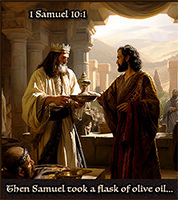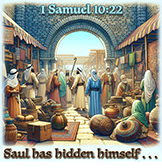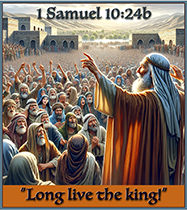1 Samuel 10:1–27 . . . Bible Study Summary with Videos and Questions
“Saul Is Anointed as Israel’s King”
This chapter is unlike all others. Samuel knew that Saul was God’s choice to become Israel’s king, however, Saul hadn't a clue. The initial portion of this chapter is largely devoted to the process God used to inform and transform Saul as the new king. Think back to our discussion in last week's summary of 1 Sam. 9:1–27 of how Saul arrived at the city entrance and turned to the first person he saw to ask directions to the “seer’s” house. It was Samuel, who informed Saul that he was that seer. But before Saul could blurt out his request, Samuel spoke words that Saul never dreamed he'd ever hear. He instructed Saul to go up ahead of him to the high place, where the sacrifice was held and where the sacrificial meal was to be eaten. Saul would eat with Samuel that day and spend the night there. The next morning, Samuel told Saul “all that was on his mind” (9:19); he then sent him on his way.
Several Signs as Proof (10:1–8)
[Note: Click the link to This Week's Passage near the bottom of this page to read today's Scripture.] As they are leaving town, Samuel instructed Saul to send his servant ahead so that he can speak privately with Saul. After doing that, but without a warning or mention, Samuel took his flask of oil and proceeded to anoint Saul’s head, informing him that God had indeed chosen him to rule over all of Israel. Samuel also kissed him (v. 1), which was more than a greeting; it was a sign of his personal support of Saul. Undoubtedly, all that was a bombshell for Saul. From the previous day's events, and the mysterious statements Samuel had made to Saul, it was becoming evident that Samuel might be speaking of Saul as the upcoming king. But now it was clear! Samuel’s words and his anointing action made it very clear to Saul that God had appointed him as Israel's king.
Three signs Because Saul (perhaps wisely) was skeptical, Samuel felt the need to tell Saul of one or more signs that would confirm what God had decided. Samuel therefore told him that there'd be a series of signs from which he'd be shown, if Saul needed proof of God's calling:
(1) Saul was to meet two men by Rachel's tomb (v. 2), men who'd tell him that his father's donkeys were safe. Samuel gave Saul a specific, prophetic word from God, by which Saul could have confidence that Samuel's anointing of him came from God. If no men had been by Rachel's tomb, or if there was only one man or three or more men, Saul would have known that Samuel wasn't really speaking God's words. And if the men by Rachel's tomb didn't tell Saul about the finding of the lost donkeys, Saul would know clearly that Samuel wasn't a true prophet. Through God, Samuel gave Saul this first sign to make him confident in what the LORD was doing.
(2) Saul was also to meet three men, at the great tree of tabor, carrying various items (vv. 3–4): . . . three young goats . . . three loaves of bread . . . a skin of wine. Again, Samuel gave Saul extremely specific predictions that were needed to be verified. Two loaves of bread wouldn't normally have been seen as an offering or a present, since bread was a basic commodity. But because Samuel had specified the loaves as a specific offering, the stranger the offering was, the more it was to be seen as a sign of God's extraordinary providence in Saul's affairs.
(3) Saul would approach a place where Philistine troops were stationed, and where he'd meet prophets at the high place of worship (v. 5). Such prophesying wasn't necessarily predicting the future, as much as it was speaking under the inspiration of the Holy Spirit. Because Saul, before this time, never appeared to have been a particularly spiritual man, his active prophesying — speaking to the Lord —was evidence that he'd become a new man. For God to use Saul to the fullest, he had to be turned into a new man by the filling of the Spirit of the LORD.
The text in v. 8 — "but you must wait seven days" — was an important command. By the nature of their office, kings didn't wait for anybody; others waited for them. But Samuel commanded Saul to wait for him because the prophet of God had more authority than this king had over Israel. Saul had to show that, even though he was a king, he'd surrender to the LORD and the LORD's prophet. We'll see that Saul's failure to wait for Samuel will get him into trouble on at least one future occasion. (Stay tuned. . .)
The Signs Come to Pass (vv. 9–13)
God changed Saul’s heart (v. 9) Samuel couldn't give Saul another heart. Only the Spirit of the LORD could do that. To demonstrate this, God didn't grant this change of heart to Saul until he left the presence of Samuel. God wanted Saul to honor and respect Samuel . . . to never look to Samuel in place of the LORD.
“Is Saul also among the prophets?” (v. 11) Saul wasn't a spiritual man but he became very spiritual when the Spirit of the LORD came upon him.
“And who is their father?” (v. 12) This question asks, “Who is the source of the inspiration upon the prophets?” If God is their inspiration, then why should it be strange that God could inspire an unlikely man such as Saul?
After Saul stopped prophesying (v. 13) Saul prophesied without ever really being called as a prophet. This shows us that someone can receive prophecy as a gift from the Holy Spirit without really becoming a "prophet" in the sense of having that office or title.
Because Saul was a man who sometimes needed convincing (see v. 22), Samuel prophesied regarding the events that were to happen in the next few hours (v. 6). Let's remind ourselves of how the signs were seen in reality. First, on the road to Rachel’s tomb, they'd meet two men who'd inform them of what Samuel had already told them, namely that the lost donkeys had been found and Saul’s father was worried about his son (v. 2).
Thereafter, when they reached the “great oak tree of Tabor” (v. 3), they encountered three men going up to Bethel for a hearty worship of God. One man had three kids, another had three loaves of bread, and the third had a jug of wine. The three didn’ only greeted Saul and his servant, they also intentionally gave them two loaves of bread they were to take with them as their provisions for the remainder of their travel home.
Saul Hides His Experience But Is Made King (vv. 14–27)
When Saul arrived home, his uncle greeted him and questioned him about what he'd done while he was gone and where he went (v. 14). This may have been a simple, logical question. Or, Saul's uncle may have asked because he'd noticed that Saul had very, very oily hair! Nevertheless, Saul gave only sketchy facts, avoiding the mention of his anointing. Saul’s silence may have only spurred his uncle on, because he certainly was interested in what had happened, especially after he learned that Saul had met with Samuel. Because Saul told him only the part about the donkeys, Samuel would have to be the one who'd publicly introduce Saul as Israel’s king.
Saul and his servant reached the hill of God at Gibeah, where the Philistine outpost was stationed. What happened to Saul on that hill wasn't natural; it was supernatural. The Spirit of God came upon Saul who then prophesied, as did the prophets with him. It was apparent to those who witnessed this amazing incident that Saul was indeed among the prophets. This is important because this was a public demonstration of God having empowered Saul to judge the nation as its king. This supernatural event was done in public; the change in Saul became proverbial, in that even those who hadn't witnessed this event had heard of it. It was the public's first indication that Saul would become Israel’s king.
The public would soon witness more of Saul's empowerment. Samuel called all of Israel to Mizpah (v. 17), which is where they repented and turned to God at the beginning of Samuel’s ministry (see our summary of chapter 8). There he confronted a very eager audience, enthusiastic and optimistic of what was to come. Samuel once again reminded the Israelites that their demand for a king was a manifestation of their disobedience and unbelief. He indicated that it was then, and up to that very day, a rejection of God. This God, whom they'd replace with a human king, was the One who'd delivered them from all their difficulties. It wasn't their new king who'd deliver; God had always been their deliverer and would continue to do so. In spite of Israel’s sin, God was about to graciously give them the king they demanded.
Having been selected by the casting of lots, Saul was nowhere to be found. Few people knew him or his whereabouts. By further inquiry of the Lord, Saul was found hiding by the baggage supplies (v. 22). People ran to the luggage, found Saul, and brought him to Samuel. When the people saw Saul, they were greatly impressed. He was a man whom we've already learned was very handsome (9:2); we're again told that he was taller than any other Israelite (v. 23). In effect, Saul is the “Goliath” of Israel, a handsome giant of a man. From a merely physical perspective, Saul was first-class material.
Samuel pointed out to the people what an extremely pleasing choice God had made for them: “Do you see the man the Lord has chosen? There is no one like him among all the people” (v. 24). No one could have asked for more. The people understandably shouted, “Long live the king!” Then Samuel spelled out all of the ordinances pertaining to kingly rule, writing them on a scroll that he placed before the Lord. He then sent the people home.
Similarly, Saul went home, accompanied by a group of valiant men whose hearts God had touched. Accompanying him wherever he went, they protected him from those who might cause him harm. These men clearly were further evidence that Saul was God’s choice for Israel’s king. Not all the people saw it this way; v. 27 informs us of a group of worthless men — scoundrels — who didn't see Saul as their deliverer. We really don’t know why they looked down upon Saul, but their most serious sin was to doubt and dispute God’s choice of their king. While all the others had gifts for Saul, these worthless fellows didn't. Their disdain for Saul was obvious. Nevertheless, Saul chose to remain silent and do nothing about them for that moment. They'll appear again in our text, next week (see our next summary of 11:1–15).
Samuel, Saul, and his young servant made their way up to the high place, where they were given the place of honor at "the head of all the invited guests" and received "a special portion of the meal." In that culture, the seating arrangement at dinner had a unique protocol. The seat of honor was always on one particular side, next to the host. It was a great honor for Saul to have been seated there, next to Prophet Samuel. And when Samuel told the cook, "Bring the piece of meat I gave you, the one I told you to lay aside," Saul received that special portion. In that culture, every meal had a special portion to be given to the one whom the host wanted to honor highly. Saul was the highly honored guest at this meal.
Samuel spoke with Saul on the roof of the house: Although the topic(s) isn't disclosed, it's likely that Samuel told Saul all about Israel’s desire for a king, that God had chosen him personally, and how he'd better be a good king for the people of Israel.
† Summary of 1 Samuel 10:1–27
This passage records the anointing of Saul by the prophet Samuel, marking Saul’s official selection as Israel’s first king. Samuel pours oil on Saul’s head and gives him specific signs to confirm God’s choice — such as meeting men who will tell him the donkeys he sought have been found, encountering prophets, and being filled with the Spirit of the Lord, which will change him and cause him to prophesy (10:1–7). These signs affirm that God is empowering Saul for his new role.
Samuel then gathers the tribes of Israel at Mizpah to publicly present Saul as king. The tribes, clans, and families are called forward by lot until Saul, from the tribe of Benjamin, is chosen (vv. 17–21). Though Saul initially hides, he’s brought forward, standing taller than the others, and the people acclaim him as king, shouting, “Long live the king!” (vv. 22–24). Samuel advises the people about the responsibilities and behavior required of a king, writing these instructions in a book and laying it before the Lord (vv. 25). Saul goes home accompanied by valiant men whose hearts God touched, but some reject him, doubting his ability to save Israel, though Saul remains silent (vv. 26–27). This chapter marks the formal establishment of the monarchy in Israel under divine approval.
Key points with verse references:
• Samuel anoints Saul with oil and gives him signs confirming his divine appointment as king (vv. 1–7).
• Saul is publicly chosen by lot from among the tribes of Israel, highlighting God’s sovereign selection (vv. 17–21).
• Saul is presented to the people and acclaimed as king, standing head and shoulders above others (vv. 22–24).
• Samuel instructs the people about the duties of kingship and records these guidelines before the Lord (v. 25).
• Saul’s reign begins with loyal followers but also opposition from some who doubt him; Saul remains patient (vv. 26–27).
This Week's Passage
1 Samuel 10:1–27
New International Version (NIV) [View it in a different version by clicking here; also listen to chapter 10 narrated by Max McLean].
† Summary Video: “The First Book of Samuel”
† Watch this introductory video clip created by BibleProject on bibleproject.com.
- Q. 1 Why did Samuel anoint Saul privately at this time? In a word or two, how do you think Saul felt?
- Q. 2 Why does Saul explain to his uncle the newfound donkeys but not his kingship (v. 16)?



